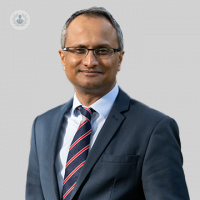Advances in prostate cancer diagnosis and the problems with the PSA test
Written by:The current methods for diagnosing and treating prostate cancer are letting many men down. Advanced imaging, minimally-invasive biopsies and therapies mean men will have fewer and better biopsies with treatments with fewer side-effects. The outlook for men with prostate cancer is already looking better than it did only five years ago.

Conventional biopsy - the PSA test
Men who are concerned about prostate cancer can request a serum prostate specific antigen (PSA) test. The problems with having a PSA test is that an abnormal level is not specific to prostate cancer and many men will undergo invasive tests unnecessarily. TRUS biopsy is a random process. A needle is used 10-12 times in the hope of finding cancer of the prostate. It can be harmful, contamination is a risk as the needle passes through the rectum and there are other risks like haematuria (blood in urine), haematospermia (blood in semen) and pain. TRUS biopsies can find tiny cells that look like cancer but do not grow and do not spread in the vast majority of cases, even if left for years. One in three men above the age of 50 actually have these low-risk cancers and may end up having unnecessary treatment as a result. The biopsies can actually also miss important cancers that will grow and spread if left untreated, studies have shown that TRUS-biopsy has a sensitivity of only 48% for clinically significant cancers.
Conventional treatment - radiotherapy or surgery
Once a man is diagnosed with prostate cancer, the entire prostate is treated with radiotherapy or surgery. Both of these treatments inevitably cause damage to surrounding structures leading to side-effects such as urine incontinence, erectile dysfunction, rectal diarrhoea, bleeding and discomfort. This might be acceptable if the treatment was effective but it only offers a 5% improvement in survival chances over giving no treatment at all.
A new, targeted approach
Thankfully things are changing for the better. A high-quality MRI is changing how we manage prostate cancer. Firstly, men can avoid a biopsy as a result, the MRI is wrong in 5-10% of cases and the chance of these missed cancers progressing is rare. Secondly, if they do need a biopsy, they can have a more accurate biopsy with a very low risk of infection called a transperineal MRI-ultrasound fusion biopsy. The needle is guided more accurately through the perineal skin rather than through the rectum. If cancer is found, many men can have a treatment that leads to a dramatically lower risk of side-effects. This is called focal therapy. This involves targeting the tumour, rather than the whole prostate so damage to surrounding structures is reduced. Focal therapy can use a number of energy sources to destroy tissue precisely. The most common are high-intensity, focused ultrasound (HIFU) and cryotherapy. In expert urology hands, the risk of side-effects is relatively small.


